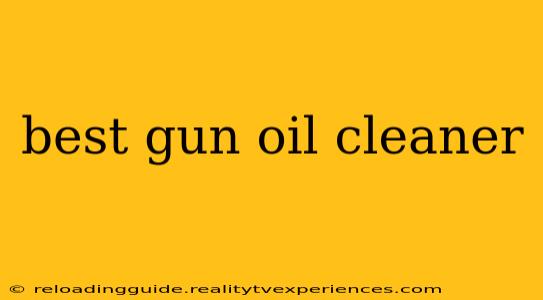Maintaining your firearms is crucial for their longevity, reliability, and safe operation. A key component of this maintenance is choosing the right gun oil cleaner. This isn't just about removing dirt and grime; it's about protecting your investment and ensuring your firearm functions flawlessly when you need it most. This guide will help you navigate the world of gun oil cleaners, identify your needs, and choose the best product for your specific firearm and cleaning routine.
Understanding the Importance of a Good Gun Oil Cleaner
Before diving into specific products, let's understand why a dedicated gun oil cleaner is essential. Simply wiping down your firearm isn't enough. Gunpowder residue, lead, copper fouling, and other contaminants can accumulate, leading to:
- Reduced accuracy: Buildup interferes with the smooth operation of moving parts, affecting accuracy and precision.
- Increased wear and tear: Abrasive particles can scratch and damage internal components.
- Malfunctions: Fouling can cause jams, misfires, or other malfunctions that could compromise safety.
- Corrosion: Moisture and residue can lead to rust and corrosion, especially in humid climates.
Types of Gun Oil Cleaners
Gun oil cleaners come in various forms, each designed for different purposes and cleaning methods. The best choice depends on your firearms, the level of fouling, and your personal preferences.
1. Solvent-Based Cleaners
These are typically the most powerful and effective at removing stubborn fouling. They often contain solvents that break down carbon, lead, and copper deposits. However, they can be more harsh on certain firearm finishes, so always refer to your firearm's manufacturer's recommendations.
- Pros: Excellent at removing tough fouling.
- Cons: Can be harsh on some finishes, requires thorough rinsing and lubrication afterward.
2. Non-Solvent Based Cleaners
These cleaners generally rely on less harsh chemicals and are often considered gentler on firearm finishes. They are a good choice for routine cleaning and maintenance.
- Pros: Gentler on finishes, often easier to use.
- Cons: May not be as effective at removing heavy fouling.
3. CLP (Cleaning, Lubricating, Protecting) Products
CLP products combine cleaning, lubricating, and protective properties in a single bottle. They are convenient for quick cleanings and general maintenance, but may not be the best choice for heavy fouling.
- Pros: Convenient, all-in-one solution.
- Cons: May not be as effective as dedicated cleaners for heavy fouling.
Factors to Consider When Choosing a Gun Oil Cleaner
Choosing the best gun oil cleaner depends on several factors:
- Type of firearm: Different firearms may require different cleaning methods and products.
- Level of fouling: Heavy fouling requires a more powerful cleaner than light fouling.
- Finish of the firearm: Some cleaners can damage certain finishes, so always check compatibility.
- Personal preference: Some people prefer solvent-based cleaners for their effectiveness, while others prefer non-solvent cleaners for their gentler approach.
Tips for Effective Gun Cleaning
Regardless of the cleaner you choose, follow these tips for effective gun cleaning:
- Always wear appropriate safety gear: Eye protection and gloves are recommended.
- Clean in a well-ventilated area: Solvent-based cleaners can release fumes.
- Follow the manufacturer's instructions: Each cleaner has specific instructions for use.
- Thoroughly rinse and lubricate after cleaning: This prevents corrosion and ensures smooth operation.
Conclusion
Selecting the best gun oil cleaner is crucial for maintaining your firearms and ensuring their safe and reliable operation. By understanding the different types of cleaners and considering the factors outlined above, you can choose the right product for your needs and keep your firearms in top condition for years to come. Remember, proper gun maintenance is not just about cleaning; it's an investment in safety and longevity.

